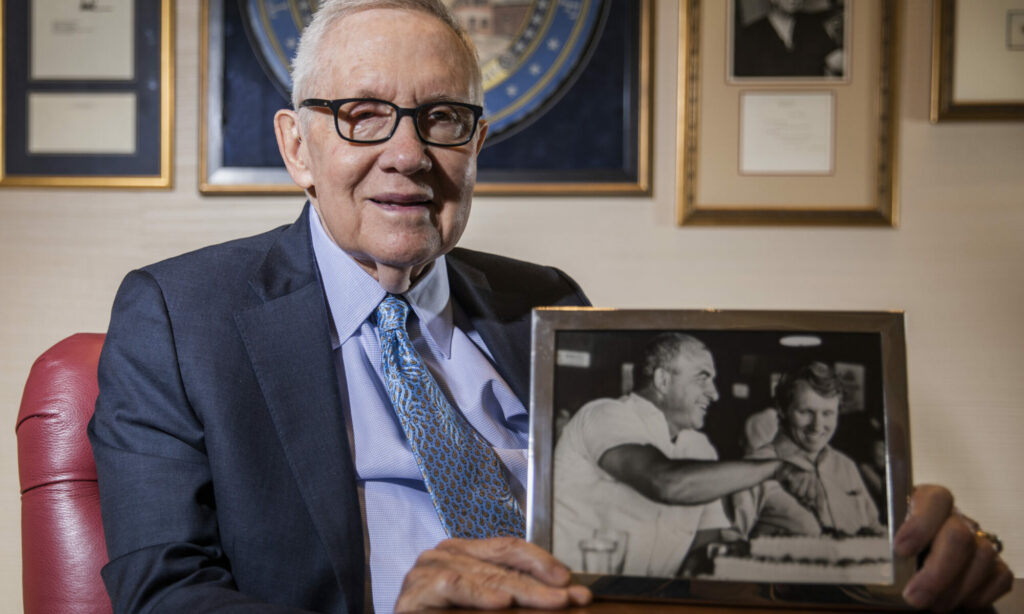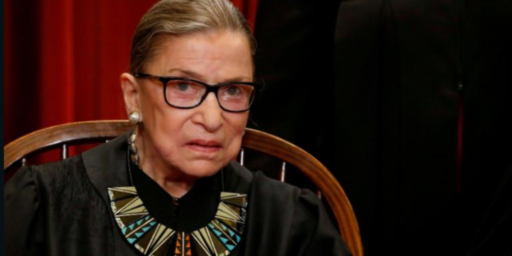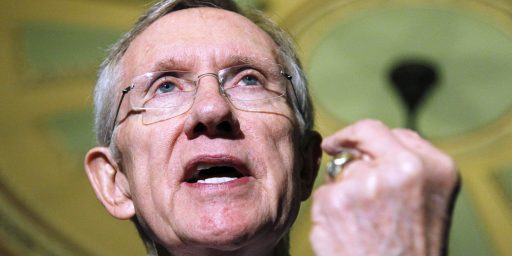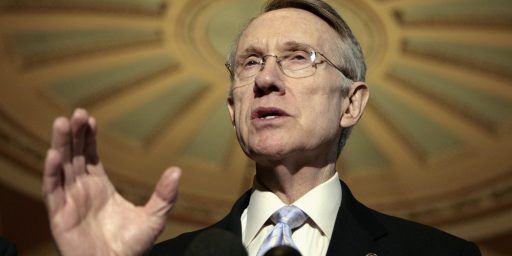Harry Reid, 1939-2021
The longtime Senate leader is gone at 82.

Nevada Independent (“Harry Reid, former Senate majority leader and Democratic kingmaker, dies at 82“):
Harry Reid, who rose from abject poverty in rural Nevada to become one of the most influential state and national leaders, died at home on Tuesday after a four-year battle with pancreatic cancer. He was 82.
In a statement, Reid’s wife of 62 years, Landra, described her husband as a “devout family man and deeply loyal friend” and said he passed away peacefully surrounded by family.
Reid was thought to be nearing the end of his life when he underwent surgery in 2018 for pancreatic cancer, which has one of the lowest survival rates. Last summer, however, Reid announced that he underwent an experimental surgery and was declared in “complete remission” and cancer-free.
“We greatly appreciate the outpouring of support from so many over these past few years,” Landra Reid said. “We are especially grateful for the doctors and nurses that cared for him. Please know that meant the world to him.”
Over more than three decades of service in Congress, Reid earned a reputation for fighting relentlessly to protect his home state and everyday Americans. As Senate Democratic leader for a dozen years, he played an instrumental role in passing the Affordable Care Act and shepherding through Congress pivotal economic recovery legislation in the wake of the Great Recession.
“I wouldn’t have been president had it not been for your encouragement and support, and I wouldn’t have got most of what I got done without your skill and determination,” former President Barack Obama said in a statement.
President Joe Biden called Reid “a dear friend and a giant of our history.”
“If Harry said he would do something, he did it. If he gave you his word, you could bank on it. That’s how he got things done for the good of the country for decades,” Biden said in a statement. “Harry looked at the challenges of the world and believed it was within our capacity to do good, to do right, and to do our part of perfecting the Union we all love.”
Reid also spent considerable time focusing on water, energy and public lands, issues at the forefront of a state that was undergoing rapid growth. In 2020, Reid said more than half of his congressional papers dealt, in some form, with the environment.
A savvy dealmaker and sometimes polarizing figure who made as many enemies as he did friends, Reid still earned the respect of colleagues in both parties — sometimes turning former enemies to friends. Soft-spoken with a sharp tongue, Reid compelled those around him to listen.
Reid took a no-holds-barred approach to politics, directly calling bankers to bail out the faltering CityCenter project on the Las Vegas Strip and falsely claiming Mitt Romney hadn’t paid his taxes in 10 years.
He helped Nevada punch above its weight on the national political stage by advocating that the state hold the first-in-the-West caucus in the nation in 2008, a move that has left Nevada’s presidential nominating contest just behind those in Iowa and New Hampshire. The caucus has brought droves of presidential contenders through the state every four years for the last four election cycles, elevating the state’s profile nationally.
He also turned the Nevada State Democratic Party into a well-oiled political operation — nicknamed the Reid Machine — responsible for securing numerous Democratic victories in close races over the last decade.
“To say Harry Reid was a giant doesn’t fully encapsulate all that he accomplished on behalf of the state of Nevada and for Nevada families; there will never be another leader quite like Senator Reid,” Gov. Steve Sisolak, a Democrat, said in a statement. “To me, he was a mentor, a father figure, and someone I trusted to always give it to me straight.”
NYT (“Harry M. Reid, Senate Majority Leader Behind Landmark Democratic Victories, Dies at 82“):
Harry M. Reid, the Democrat who rose from childhood poverty in the rural Nevada desert to the heights of power in Washington, where he steered the Affordable Care Act to passage as Senate majority leader, died on Tuesday in Henderson, Nev. He was 82.
Mr. Reid had been treated for pancreatic cancer, which was diagnosed in 2018, but lived to see the Las Vegas airport renamed for him earlier this month. His death was confirmed in statements from Gov. Steve Sisolak of Nevada and Senator Chuck Schumer, Democrat of New York and the majority leader.
Even by the standards of the political profession, where against-the-odds biographies are common and modest roots an asset, what Mr. Reid overcame was extraordinary. He was raised in almost Dickensian circumstances in tiny Searchlight, Nev.: His home had no indoor plumbing, his father was an alcoholic miner who eventually died by suicide, and his mother helped the family survive by taking in laundry from local brothels.
After two decades of campaigns in Nevada marked by success, setback and recovery, Mr. Reid was elected to the Senate in 1986. He became the chamber’s Democratic leader after the 2004 election.
But it was not until his colleague Barack Obama was elected president four years later that Mr. Reid was able to meld his deep knowledge of congressional rules, his facility with horse-trading and his cussed determination to unify his 60-seat majority and pass landmark legislation.
“If Harry said he would do something, he did it,” President Biden, who served as Mr. Obama’s vice president, said in a statement Tuesday evening. “If he gave you his word, you could bank on it. That’s how he got things done for the good of the country for decades.”
Pushing through a sweeping economic stimulus after the Great Recession, a new set of rules governing Wall Street and the most significant expansion of health care coverage since the Great Society of the 1960s, all with scant Republican support, Mr. Reid became, along with House Speaker Nancy Pelosi, one of the indispensable lawmakers of the Obama era.
“The records will be written about the eight years of Obama and Reid,” Mr. Reid boasted shortly after he announced in 2015 that he would not seek re-election the following year.
Yet the three-decade Senate tenure of this soft-spoken yet ferociously combative Nevadan, a middleweight boxer in his youth, also traced the chamber’s evolution from a collegial and consensus-oriented institution to the partisan and fractured body it has become. Republicans placed some of the blame on Mr. Reid for this change, pointing to his 2013 decision to upend Senate rules by doing away with the filibuster on most nominations by a president.
Mr. Reid, though, reflected the broader leftward shift of his party and his state. First elected to the House of Representatives in 1982, when Nevada finally grew large enough to require a second seat, he arrived in the capital as a moderate western Democrat: opposed to abortion rights, largely supportive of gun rights and uneasy about immigration.
But as Nevada grew from an overwhelmingly rural, white redoubt of ranches and mines to a polyglot gambling mecca in which 70 percent of voters live in the Las Vegas area, Mr. Reid adapted as a matter of necessity. He won his final re-election in 2010, a dismal year for Democrats nationally, thanks in part to an outpouring of support from his state’s rapidly growing Hispanic and Asian communities after his popularity among many other Nevadans had plummeted in the economic collapse.
WaPo (“Harry M. Reid, pugnacious Senate majority leader, dies at 82“):
Harry M. Reid, a Nevada Democrat who rose from a hardscrabble mining town to become one of the longest-serving Senate majority leaders in history and a political force during the presidencies of George W. Bush and Barack Obama, died Dec. 28 at his home in Henderson, Nev. He was 82.
The death was confirmed by David Krone, a former chief of staff. Mr. Reid was diagnosed with pancreatic cancer in 2018.
A combative but soft-spoken former amateur boxer, Mr. Reid displayed an economy of personal magnetism and embraced the art of the scrappy insult. Columnist Molly Ivins called him ”charismatically challenged.” Obama, a friend and political ally, euphemistically remarked on his “curmudgeonly charm.”
Mr. Reid was never a commanding presence before a crowd or on television. Sometimes he was barely audible, and he tended to litter his speeches with awkward pauses. But he was the consummate inside player, exercising his political and legislative skills behind the scenes.
He was Senate majority leader from 2007 through 2014. Since the position’s creation in the 1920s, only two senators have held it longer: Democrats Mike Mansfield of Montana, from 1961 through 1976, and Alben W. Barkley of Kentucky, from 1937 through 1946.
After overcoming long odds to achieve political leadership, Mr. Reid was not one to apologize for being who he was.
“I didn’t make it in life because of my athletic prowess,” he said in his 2016 retirement speech, at the end of five terms in the Senate. “I didn’t make it because of my good looks. I didn’t make it because I’m a genius. I made it because I worked hard.”
Acknowledged even by Republican adversaries as a wily tactician and master of the Senate’s arcane rules, Mr. Reid notched his greatest legislative achievement in 2009, when he steered a landmark health-care bill through the Senate over solid GOP opposition.
In an effort to secure a filibuster-proof 60 votes, Mr. Reid spent hours behind closed doors, massaging the complex legislation and cutting deals with moderate Democrats. To ease the concerns of Sen. Ben Nelson (D-Neb.), for example, Mr. Reid agreed to a generous Medicaid reimbursement provision, specifically for Nebraska — a deal critics labeled the “Cornhusker kickback.”
Washington Post columnist David Broder called Mr. Reid’s dealmaking “crass and parochial,” but it worked. On Dec. 24, 2009, the Senate’s 58 Democrats and two independents voted to approve the Patient Protection and Affordable Care Act, commonly called Obamacare. After it passed the House of Representatives, Obama signed the bill into law in 2010.
My real-time assessment of Reid was quite similar to Broder’s. I’d been closely following American politics since shortly before he was elected to Congress and saw him evolve from a moderate backbencher to a partisan hack in leadership.
Way back in 2006, when he was drawing fire from home-state observers for his obstruction of the Bush agenda, I observed,
His predecessor, Tom Daschle, faced similar problems in conservative South Dakota. As I’ve noted many times, Reid always struck me — and I gather his home state constituents — as a thoughtful, moderate fellow. My guess is that he still is. His role as party leader, and especially as opposition party leader, does not allow him to be that anymore.
The increasingly polarized tone of Washington rewards pitched rhetoric and parliamentary gamesmanship. Yet voters have consistently demonstrated that they hate those things. Coupled with the fact that Reid, and Daschle before him, are forced by their institutional roles to do whatever they can to thwart the president their constituents also voted for, this is a dicey situation, indeed.
Five years later, when he abolished the filibuster for Supreme Court nominations after years of decrying this as “the nuclear option” when Republicans threatened it, I observed,
I’m quite sympathetic to Reid’s move here. It doesn’t strike me as hypocritical, in that eliminating the filibuster altogether-or even just on Supreme Court nominations-is a much more fundamental step than limiting serial filibusters on the same motion. A precedent-setting maneuver is sometimes the only viable response to the unprecedented abuse of the procedures.
Reid was handed the baton at a particularly rough time in modern American politics. The Bush years were incredibly divisive and the Democrats won back the Senate in the 2006 midterms. Daschle had been defeated in his 2004 re-election bid and it was now Reid’s turn. He did his best to run out the clock on the Bush agenda and, particularly, his judicial picks. Mitch McConnell would return the favor in spades when Barack Obama was elected two years later.
Like Broder, I long for a time when the Congressional leadership and Presidents, regardless of party, worked together in good faith. The job of an opposition leader is to forge compromise, not to obstruct willy-nilly. But the vagaries of the primary system and the modern media and fundraising environment disincentivizes compromise and rewards outrageousness. I’m not sure Reid had better options.





Could you say the same thing about any Republican in Congress today? Certainly not the leadership…
Not entirely though. I take Mitch at his word when he says he probably wouldn’t advance a SC nomination from Biden if the GQP takes control of the Senate next term.